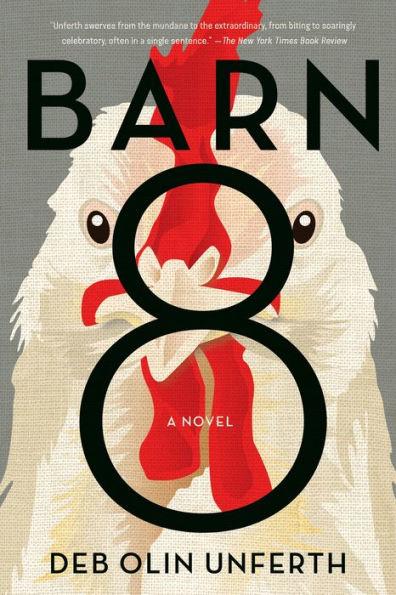
LITERARY FICTION
Deb Olin Unferth
Graywolf Press
Paperback (also available as an e-book), 978-1-6444-5015-4, 256 pgs., $16
March 3, 2020
Janey, twenty-something and drifting aimlessly about, and Cleveland, model of by-the-book probity, conduct consumer audits of layer-hen egg farms in Iowa, which involves certifying best practices for consumer safety and the health and welfare of the chickens. They spend their days in barns, “[n]ot the barns of once upon a time, retro or relic, that red-planked national emblem . . . but the barns of now, the powerful machines, the massive robot supercomputers, the human-made megafauna.”
One day, Cleveland breaks, taking home a single hen from the farm she’s inspecting. Then, she takes two hens, then another and another, dropping them off at a shelter run by Dill, “that humorless man named for an herb” (no “corporate tacos”), an animal-rights activist who used to supervise a force of undercover investigators who would get themselves hired as farmhands. Janey joins Cleveland in the rescue operation, and they conceive a plan to empty an entire egg farm in one night—a million hens, give or take.
Barn 8: A Novel is new literary fiction from Austin’s Deb Olin Unferth, associate professor of creative writing at the University of Texas at Austin, author of five previous books, including Revolution: The Year I Fell in Love and Went to Join the War, a National Book Critics Award finalist. Barn 8 is metaphysics grounded in dirt, generous and large hearted, economical yet evocative phrases and long, breathless sentences of pure urgency.
Unferth’s characters are alive on the pages in their rough relationships and messy motivations. Dialogue is smart and rapid-fire, as if the Gilmore Girls and Bruce and Cybil from Moonlighting were playing these parts. Barn 8 is suffused with humor, from chuckles to full-throated guffaws.
“I’ll have to do some computations. The question is,” said Jonathan, “how many birds per minute need to be leaving the barns.”
Annabelle took out a pad.
“You got a chisel too?” He rose. “I’ll go get my laptop.”
“Why don’t we phone the FBI and invite them over?” Annabelle slapped down a pen. “Everything goes on paper.”
Jonathan appealed to the ceiling.
I am charmed by Unferth’s structure. The tag-team narration is handed off between the telescoping, limited third-person perspectives of Janey, Cleveland, and Dill (and the occasional cameo, including a hen) and an omniscient, first-person wide-angle that sometimes segues into second person, speaking directly into the camera. At one point, two views of the same conversation face each other on two pages, and a Q&A that we assume is law enforcement turns out to be conducted by divine interrogators.
The Texas Observer is currently reporting on a Texas law that makes it a crime to fly a drone over a feedlot, and in Barn 8, Iowa has an ag-gag law; it is a crime to report, basically. What is not allowed to be reported? The horror of “placing the baby-soft beaks of chicks into hot-iron guillotines, searing off the tips, while the chicks struggled and their faces smoked.”
Barn 8 moves swiftly and steadily, surreal descriptions of industrial egg-farming (two-story barns made of steel and concrete, cages rising twenty-five-feet high, chains bringing feed, belts carrying off excrement, sun rising and setting on a timer, eggs going by on conveyors, 150,000 hens to a building) and alternate futures (among other things) tucked between chapters.
Does resistance of any scale matter? How do you fight “the existential power of size”? Sometimes all you can do is “lessen the lessening,” but that counts—a necessary something.
“Sparrows overhead. A flock circling in uneven loops. Is it instinctual, these ovals, these spirals, this retracing of one’s steps? Do all animals, even all natural phenomena, move like that, have this in common, where everything you see is moving, but nothing is getting anywhere? The solar system, time, water as it falls from the sky and rises back into it, birth and death, work and home . . . Only the universe is a long breath out.”
Deb Olin Unferth is the author of six books, including the memoir Revolution: The Year I Fell in Love and Went to Join the War, finalist for the National Book Critics Circle Award; the story collection Minor Robberies; and the novel Vacation, winner of the Cabell First Novel Award. Her work appears in Harper’s, The Paris Review, McSweeney’s, Tin House, Granta, and elsewhere. She has received a Guggenheim Fellowship, three Pushcart Prizes, and a grant from Creative Capital for Innovative Literature.
Unferth is an associate professor of creative writing at the University of Texas at Austin, where she teaches for the Michener Center and the New Writers Project. She founded and runs the Pen-City Writers, a creative-writing certificate program at a maximum-security prison in South Texas, for which she won the 2017 Texas Governor's Criminal Justice Service Award.
